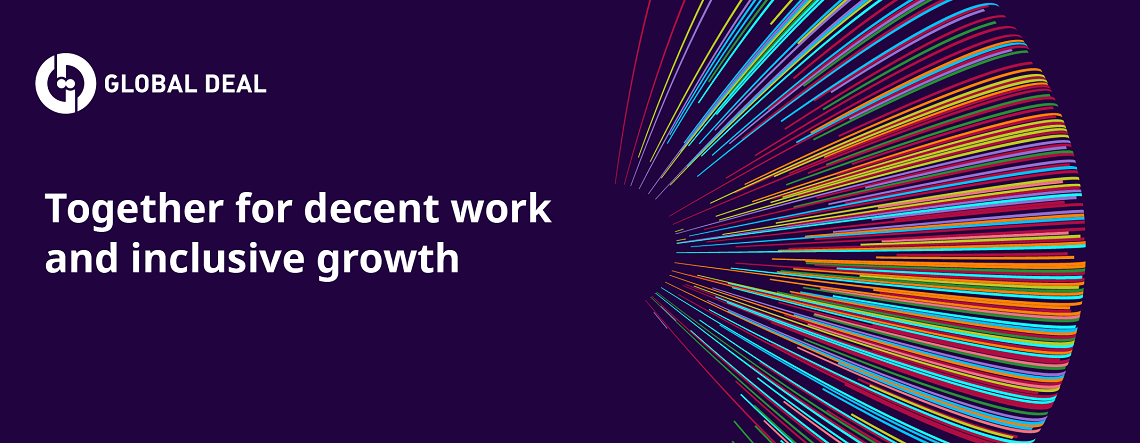The Global Deal is a global multi-stakeholder partnership that aims to promote social dialogue and joint cooperation as an instrument to achieve inclusive growth and ensure that economic gains are broadly shared. The Global Deal partnership currently numbers over 100 members from states, businesses, trade unions and other groups with a common interest in a fair and well-functioning labour market.
The Decent Work Agenda consists of four main pillars: full and productive employment delivering a fair income, rights at work, social protection and social dialogue, with gender equality as a cross-cutting issue. Decent work is also one of the 17 Sustainable Development Goals to be reached by 2030, with indicators focussing on safe and secure working environments and the protection of labour rights for all workers. Importantly, decent work is in the common interest of workers, business and society at large as it helps ensuring social peace, political stability and openness to change, thus providing a stable business environment.
Social dialogue is part and parcel of decent work. Social dialogue gives workers a “collective voice”, the freedom to express their opinions and concerns openly and to organise and participate in the decisions that affect their jobs and lives. At the same time it is a key mechanism through which divergent interests can be reconciled and, as such, a driver of both decent work as well as a more productive and profitable wokplace.
Good case experience from partner commitments as well as research carried out on the initiative of the Global Deal partnership testifies how social dialogue can lead to decent work. Amongst many others, the following examples can be highlighted:
- H&M’s framework agreement with IndustriALL and Swedish IF Metall on how to work together to implement well-functioning industrial relations at H&M’s own operations, direct suppliers and subcontractors. Both worker representatives and management receive training in good social dialogue practice. As one of its results, the first collective agreement in the fast-fashion sector in Turkey was recently reached between H&M -Turkey and Koop-Is Union. The agreement covers 3000 workers and provides them with regular pay rises and better working conditions.
- VINCI’s agreement with the Building and Wood Workers’ International to ensure that construction workers in Qatar are treated with dignity and guaranteed safe and decent living and working conditions. This concerns all workers including migrant workers who, prior to deployment to Qatar, are informed of employment terms and conditions, rights and responsibilities, and health and safety risks. Through workers’ committees, workers and management can discuss working and living conditions and rights. An extensive system of follow-up, reporting, monitoring, inspection, and auditing has been set up.
- Struggling with high inequalities and social strife, the South African government in 2014 called upon the National Economic Development and Labour Council (Nedlac) to address rising inequality and instability in labour markets. The social dialogue that followed resulted, on the one hand, in the introduction of a national minimum wage covering all workers and increasing wages for 6.4 million workers – half of the workforce. On the other hand, a code of practice on collective bargaining and industrial action was also agreed upon by all sides.
- The latest Global Deal brief on the contribution of social dialogue to gender equality describes how collective bargaining helps to pursue equal pay for equal work by defining clear wage standards, by pursuing gender-neutral job classification systems and by improving pay for low-paid workers and female-dominated sectors. At the same time, a gender-inclusive workplace helps companies to attract and retain the best employees, thus helping to achieve above-average profitability.

